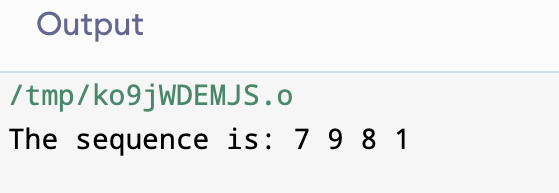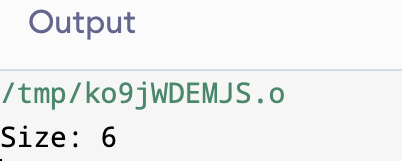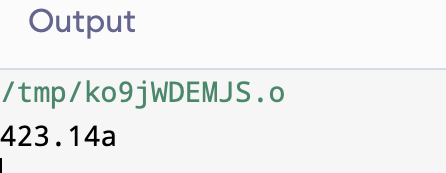std::integer_sequence in C++ 14Developers frequently need loops and iteration when programming. Sometimes, it's necessary to loop through a range of numbers whose span is unknown; in those cases, the std::integer sequence comes in handy. Users can construct an integer sequence at compile time using C++14's std::integer_sequence function. Before running, the program is aware of the integer sequence. This tool allows users to simplify code through template programming and meta-programming. When std::integer_sequence is passed as an argument to a function template, the parameter pack Ints, which represents the sequence of elements, can be inferred and utilized in pack expansion. Syntax:It has the following syntax: Where an integer sequence with the specified values in Ints is defined using a struct. Template Parameters:T: It is the type of the integers. Ints: It is a parameter pack of integers. Member functions:size(): It gives back the number of elements in the elemental sequence that parameter pack Ints represents. Example 1:The use of the std::integer_sequence in C++ 14 is illustrated in the code below by utilizing the syntax above. Output: 
Example 2:The code below utilizes template specialization to allow the integer_sequence_size struct to recursively determine the integer_sequence's size. Output: 
Example 3:Output: 
Explanation:
Advantages of using std::integer_sequence in C++ 14:A template class called std::integer_sequence was added to the Standard Template Library (STL) in C++14. It is mostly used to represent integer sequences at compile time when combined with variadic templates. The following are some benefits of C++14's std::integer_sequence: Compile-time integer sequences: The ability to create integer sequences at compile-time is a primary benefit of std::integer_sequence. It is helpful when working with template metaprogramming or other situations where you need to generate and manipulate an integer sequence at compile time. Parameter packs: Std::integer_sequence is frequently utilized with parameter packs to iterate over template parameter packs and execute operations on each element in a sequence. It becomes even more potent when mixed with variadic templates, allowing more versatile and general code to be written. Increasing parameter packs' size: Std::integer_sequence can make the expansion of parameter packs easier when used in conjunction with fold expressions or other methods, improving the readability and maintainability of the code. It is frequently used to execute operations on every element in a parameter pack in template metaprogramming. Index-based access: Std::integer_sequence is used to create compile-time indices for arrays or tuple-like structures. It eliminates runtime overhead by enabling you to access structure elements using these indices at compile time. Creation of code: It makes writing boilerplate code for an integer sequence with a fixed size easier. It is frequently observed in recursive algorithm implementations, where code generation is contingent upon sequence length.
Next TopicStd::regex_iterator function in C++
|
 For Videos Join Our Youtube Channel: Join Now
For Videos Join Our Youtube Channel: Join Now
Feedback
- Send your Feedback to [email protected]
Help Others, Please Share










